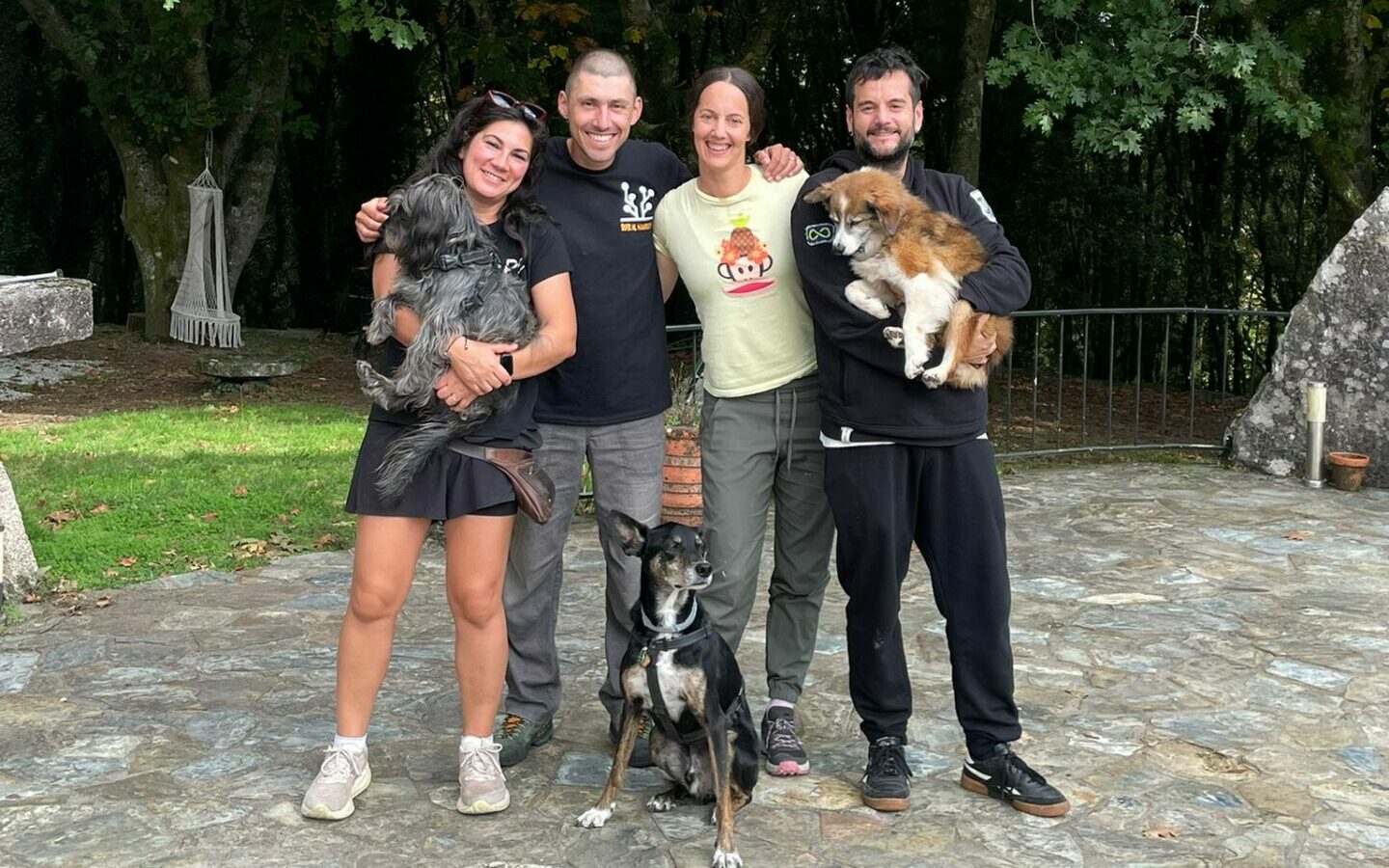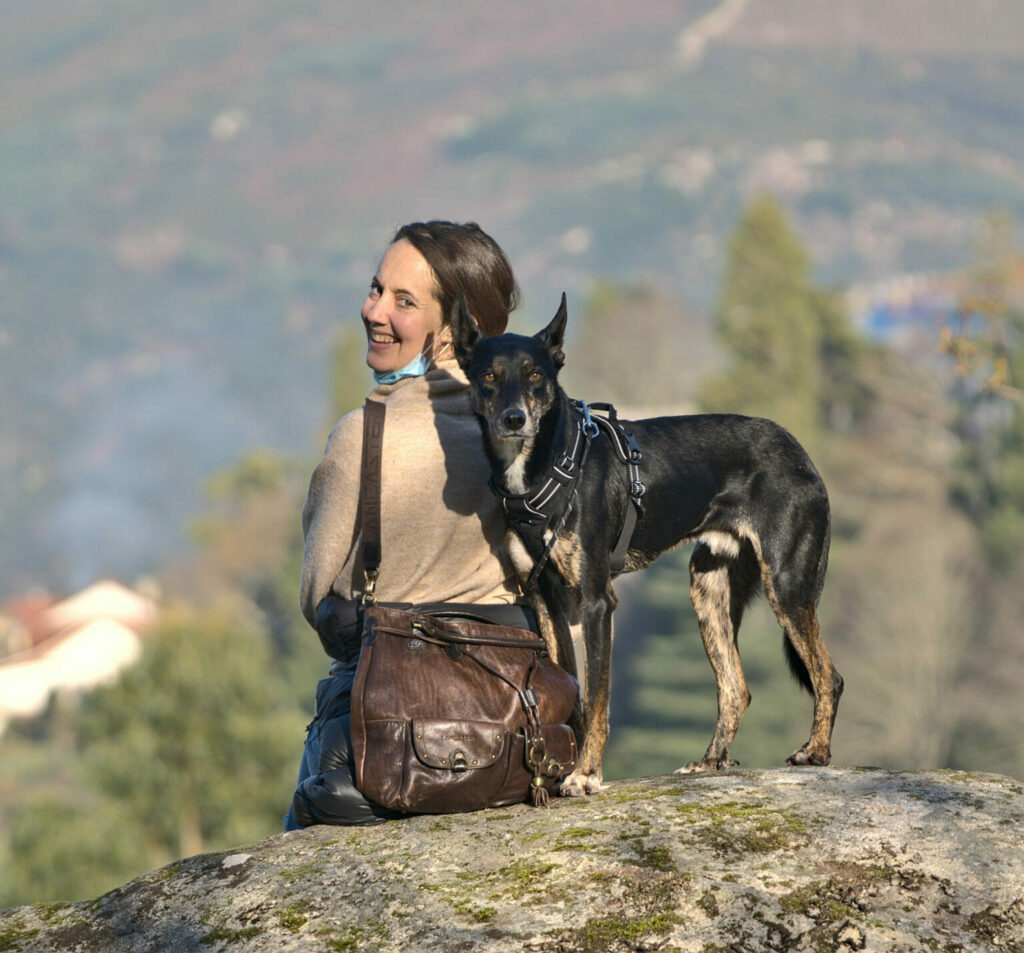The Story of Anceu and Alpiness Coliving
A personal reflection on rural transformation, unexpected friendships, and how a Galician coliving inspired Alpiness Coliving, a Swiss mountain revolution

These days, as I write this from Anceu Coliving, I’m still buzzing from the visit we just received. Ben and Fabienne, founders of Alpiness Coliving in Les Haudères, Switzerland, came back to see us after more than two years away. They brought Winchy, the beautiful dog they adopted during their time here in 2021. But more than that, they brought stories of transformation that filled me with an overwhelming sense of pride and purpose.
As I watched them present to our current 15 colivers about their journey, sharing how Anceu inspired them to create Alpiness, I couldn’t help but think back to when they first arrived in late 2020. Those were uncertain times – we didn’t even know if we’d be able to keep the coliving open. But there was something about Ben and Fabienne, a warmth that radiated from them, that made me think: “Yes, keeping this place open is absolutely the right decision.”
The Anceu Days: Where It All Began
Ben and Fabienne didn’t just pass through Anceu – they became part of its fabric. I had met them in Cloud Citadel, and then over their six-plus months here, they immersed themselves in both our rural coliving community and the broader village life in ways that still resonate today.
I remember them helping to record videos for “Pegadas do Recordo,” our local oral history project where we document the stories of village elders like Pepe and Rogelio. There’s something magical about watching Swiss millennials sitting in a Galician kitchen, cameras in hand, helping preserve the memories of octogenarians who’ve never left the area. These moments capture what rural coliving is really about – not just sharing space, but bridging worlds.
Their integration went beyond cultural projects. They joined A Rente do Chan, our local biodiversity NGO, rolling up their sleeves to clean forests and rivers alongside neighbors who initially viewed our international community with curiosity, if not skepticism. Actions speak louder than words in rural communities, and Ben and Fabienne spoke good enough in the language of showing up.

But perhaps the most telling sign of their integration was Winchy. They’d been contemplating adopting a dog for a while, but it never seemed like the right moment. Living at Anceu, surrounded by our pack of rescue dogs – Pepe, Pandora, and others – something shifted. We could see them watching how the dogs brought joy and connection to daily life. When they finally decided to take the leap, we helped facilitate the adoption through Os Palleiros, our local animal shelter. Watching them fall in love with Winchy was like watching someone find a missing piece of themselves.
From Galician Hills to Swiss Alps: Birth of Alpiness
When Ben and Fabienne left Anceu in 2022, they carried more than memories. As they told our colivers during their recent visit: “Here we realized that coliving as a rural transformation tool can be a reality.” They took this realization to Les Haudères, a small village in the Swiss Alps, and created Alpiness Coliving.
Les Haudères faces challenges both similar to and different from ours in Anceu. While we struggle with depopulation and the exodus of young people, they deal with a village that comes alive for a few months of tourism each year, then falls quiet. Where Anceu has many second homes sitting empty most of the year, Les Haudères watches its permanent residents leave, not even maintaining a connection through vacation properties.
Despite these differences, Ben and Fabienne applied the lessons learned in Galicia to their Alpine context. They opened a 9-room coliving specifically designed for remote workers who crave mountain sports and alpine beauty. But they didn’t stop at accommodation – they understood that true rural transformation requires community integration and local development.
The Ripple Effects: Real Change in Real Time
What Ben and Fabienne have achieved in just two and a half years is nothing short of remarkable:
Trava Coworking: They partnered with the local municipality to open a coworking space, transforming an underused public building into a hub of digital activity. I feel a personal connection to this achievement because in November 2023, we visited Alpiness and I presented to the municipal president about our initiatives at Rural Hackers and Anceu. Watching skepticism turn to enthusiasm as local officials understood the potential – that’s a moment I’ll never forget.
Cinema Revival: The village cinema had been closed, another casualty of rural decline. Now, Fabienne serves on the board that’s bringing it back to life, with screenings three times a week – two for adults, one specifically programmed for young people. This isn’t just about entertainment; it’s about creating reasons for people to gather, to stay, to choose village life.
Community Garden: On land provided by neighbors, they’ve created a productive garden next to the coliving. Like our work with A Casa do Pobo in Anceu, it’s about taking unused resources and transforming them into spaces of abundance and connection.
Population Growth: Perhaps most importantly, more than five people have permanently relocated to Les Haudères since Alpiness opened. In a small Alpine village, five new residents represent significant growth – new energy, new ideas, new life.
The Network Effect: Why Connection Matters
Every few months, Ben, Fabienne and I catch up via video call. We share operational challenges (how do you handle cleaning schedules when colivers have different standards?), financial models (what’s the sweet spot for pricing that keeps things accessible but sustainable?), and community integration strategies (how do you balance the needs of international colivers with local traditions?).
But these conversations go deeper than logistics. We share fears about the future – will rural areas continue to empty? Will climate change make our work irrelevant? Will the digital nomad trend that currently supports us eventually fade? We also share dreams – of villages full of children’s laughter, of elderly neighbors teaching traditional skills to young entrepreneurs, of rural areas that are chosen rather than escaped from.
This network of rural colivings – Anceu, Alpiness, and the many others emerging across Europe – represents something larger than any individual project. We’re creating a new model for rural living that doesn’t require choosing between professional ambition and community connection, between global awareness and local roots.
Lessons from the Journey: What We’ve Learned
Running rural colivings has taught us invaluable lessons about transformation, community, and the delicate art of revitalizing places that modernity left behind:
1. Integration is Everything: You can’t transform a place from the outside. Ben and Fabienne succeeded in Les Haudères because they first learned in Anceu that you must become part of the community you seek to change. Whether it’s recording oral histories, cleaning rivers, or serving on the cinema board, showing up matters.
2. Start Where You Are: Anceu has A Casa do Pobo for community gatherings; Les Haudères has a municipal building that became Trava. Every rural area has underused resources. The key is seeing potential where others see decay.
3. The Personal is Political: When Fabienne joins the cinema board, she’s not just volunteering – she’s demonstrating that young, international professionals can commit to rural futures. When we host 30+ artist residencies in Anceu, we’re proving that creativity doesn’t require urban density.
4. Networks Multiply Impact: Alone, Anceu is a nice story about a Galician village. Connected to Alpiness, and to the broader network of rural initiatives, we become a movement. Each success in one location provides proof of concept for the next.
5. Patience and Persistence: Ben and Fabienne lived in Anceu for over six months before starting their own project. They needed time to understand, to absorb, to envision. Rural transformation isn’t a sprint; it’s not even a marathon. It’s choosing a place and committing to its future.
The Challenges We Don’t Instagram
While celebrating successes, honesty demands acknowledging the challenges. Rural coliving isn’t a pastoral fantasy – it’s hard work with uncertain rewards.
Infrastructure in rural areas often struggles to support digital work. In Anceu, we’ve invested heavily in fiber optic connections and backup systems. Weather can isolate mountain communities like Les Haudères for days. Cultural differences between local populations and international colivers require constant navigation and mutual adjustment.
Financially, rural colivings walk a tightrope. Price too high, and you exclude the creative communities that bring energy and innovation. Price too low, and you can’t maintain facilities or contribute to local development. Both Anceu and Alpiness have found different balance points, but the tension remains.
There’s also the emotional weight of representing hope for places that have experienced decades of decline. When locals see young people choosing their village, expectations rise. Not every initiative succeeds, and failures feel personal in small communities where everyone knows everyone.
The Future We’re Building
As I finish writing this, looking out at the same Galician hills that Ben and Fabienne once contemplated, I’m filled with hope. Their visit reminded me that what we’re doing transcends individual projects or locations. We’re part of a broader reimagining of rural life for the 21st century.
The future we envision isn’t about returning to an idealized past or importing urban culture wholesale to rural areas. It’s about creating new forms of community that honor local traditions while embracing global connections. It’s about proving that you can build a meaningful career from a village of 50 people, that high-speed internet and ancient stone houses aren’t contradictions, that caring for your neighbors and collaborating with colleagues worldwide can happen in the same day.
When Ben and Fabienne presented to our colivers, someone asked what advice they’d give to anyone thinking about starting a rural coliving. Their answer was simple: “Find a place like Anceu first. Live the experience. Understand what it means not just to visit rural areas but to commit to them.”
The Seeds Keep Spreading
The story of Anceu and Alpiness is just beginning. As more people discover that rural life can offer what cities cannot – space, community, connection to nature, affordable living, and increasingly, professional opportunities – our villages will continue to transform.
But transformation isn’t automatic. It requires:
- People like Ben and Fabienne who see potential where others see problems.
- Local communities open to change while maintaining their essence.
- Networks of support, sharing, and mutual learning.
- Most importantly, the belief that rural areas aren’t museums of the past but laboratories for the future.
Their visit wasn’t just a reunion of old friends. It was a confirmation that we’re building something larger than ourselves – a network of living villages, connected across borders, supporting and learning from each other. When I see Winchy, adopted from a Galician shelter, now living his best life in the Swiss Alps, I see a perfect metaphor for the connections we’re creating.
The seeds we plant in one place can bloom anywhere. The lessons learned in a Galician coliving can revolutionize a Swiss village. The community created in Les Haudères might inspire the next project in Portugal, France, or Romania. This is how rural transformation happens – not through grand plans or government programs, but through people choosing places, investing in communities, and connecting across borders.
As Ben, Fabienne and Winchy drove away from Anceu after their visit, heading back to their Alpine home, I didn’t feel sad. I felt energized. Because I know this isn’t goodbye – it’s just another chapter in an ongoing story of rural reinvention, one coliving, one connection, one transformed village at a time.
The future of rural Europe isn’t being written in Brussels or Madrid or Bern. It’s being written in places like Anceu and Les Haudères, by people who believe that the best chapters of rural life aren’t behind us – they’re still to come.
